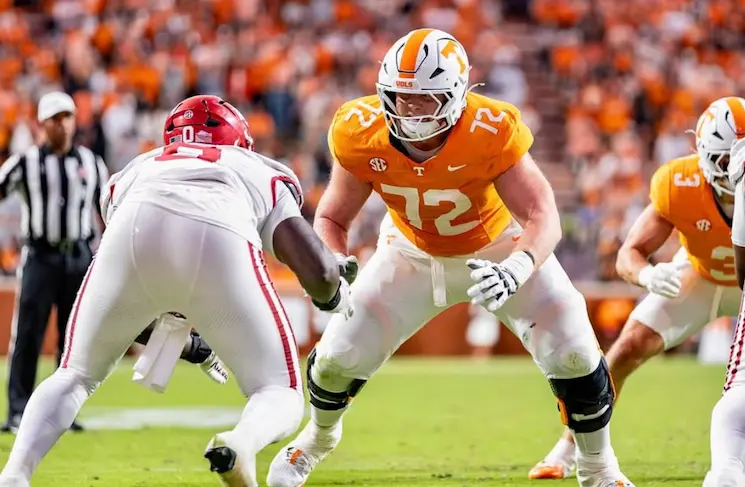
Tennessee’s men’s basketball program has experienced some movement on both the roster and coaching staff this offseason already, and more could still be on the way.
On Wednesday, star point guard Jordan Bone announced his decision to declare early for the 2019 NBA Draft. He can still ultimately return to Tennessee for his senior season, but he appears to have every intention of staying in the draft and forgoing his senior season. On Friday, Georgia State announced they were hiring Tennessee assistant coach Rob Lanier as their next head coach.
Not only have those moves already been made, but there’s plenty of reason to think at least a couple more changes could be coming for the Vols this offseason.
There’s a very good chance that two-time SEC Player of the Year Grant Williams will join Bone in declaring for the NBA Draft, and another UT assistant coach, Desmond Oliver, is considered one of the lead candidates — if not the favorite — for the Kennesaw State head coaching vacancy.
This kind of offseason movement is healthy, though.
The kind of attrition that happened at the end of Tennessee’s 2014 football season is an unhealthy type of roster movement. Tennessee saw several players transfer off the roster that offseason, and they weren’t just players who didn’t have a role on the team; they were players who looked poised for big things in the future as Vols.
Similarly, the kind of coaching movement Tennessee saw in the offseason before the 2012 and 2017 seasons weren’t healthy, either. Those offseasons saw coaches jumping ship because they realized the head coach above them wasn’t going to last much longer. Many of those coaches that left UT took lateral moves instead of upgrades.
What’s happening this offseason with Tennessee’s basketball program is the antithesis of those other offseasons.

When you have success as a program, the type of movement the Vols are experiencing this offseason is what happens. Most Vol fans are probably already aware of this, but it’s been quite a while since Tennessee’s men’s basketball team has been successful enough to have these types of problems. Heck, it’s been a while for the football program, too.
Programs like Duke, Kentucky, North Carolina, and other top schools experience movement like this just about every offseason, especially with their rosters. The most successful and healthy basketball programs have players declaring early for the draft just about every offseason, and a lot of those programs have their assistant coaching staffs poached by smaller programs as well.
Mike Krzyzewski has had over a dozen assistants go on to take head coaching jobs elsewhere during his time at Duke. The same thing goes for Roy Williams during his stints at North Carolina and Kansas. Barnes himself has a pretty lengthy track record of having assistants hired off his staff to go be head coaches elsewhere, having nearly a dozen of his assistant coaches over the years leave his bench to go run their own programs. In fact, this is the second time Lanier has left Barnes to go be a head coach.
Back in 2001, Lanier was an assistant on Barnes’ staff at Texas. He left the Longhorns to be the head coach at Sienna. He stayed there for four seasons, taking them to one NCAA Tournament appearance. He wound up at Virginia as an assistant after that, then Florida, then rejoined Barnes at Texas. He followed Barnes to Tennessee when Barnes was hired to lead the Vols.
The most successful head coaches in the game surround themselves with other high-quality coaches. That’s why their assistants are usually highly valued by other programs and why attrition like this is natural.
Tennessee is currently a hot commodity in college basketball. That hasn’t been the case in probably a decade or more, so it’s unusual to see the Vols’ coaching staff be targeted for other coaching positions, and it’s rare to see Tennessee players declare early for the NBA Draft. The last player to leave Tennessee early and be successfully drafted was Jarnell Stokes in 2014.
In fact, the Vols have only had four players since 1977 declare for the NBA Draft before their senior seasons and get drafted into the league. That’s four players in over 40 years, and three of them have come in the last 20 years. The four previous players to do so were Bernard King (1977), Marcus Haislip (2002), Tobias Harris (2011), and Jarnell Stokes (2014).
To say this kind of offseason could be unprecedented for Tennessee’s men’s basketball program isn’t all that far-fetched.
But anyone can have a really good year. A lot of teams can have a good two years like the Vols just had, in fact. But it takes a lot of hard work, great scouting, and an established culture (and sometimes a little luck) to sustain that type of success. And that’s been something that’s eluded Tennessee for a while.
The Vols haven’t had a player drafted into the NBA in consecutive years since they had a streak of seven years with at least one Vol selected from 1979-85. In a 20 year period from 1969 to 1989, Tennessee had 22 players drafted into the NBA, including four first-round picks. In the 33 years since the 1985 draft, the Vols have had just eight players drafted into the NBA, though three of them have been first-round selections.
Granted, the NBA Draft had many more rounds throughout the 1970s and into the 1980s, but the Vols also had a longer run of stability in those eras. From 1962-89, Tennessee only had three head coaches in a nearly 30-year span. Ray Mears served as head coach from 1962-77, Cliff Wettig filled in for a season after Mears fell ill, and then Don DeVoe was hired to replace him and stayed as head coach from 1978-89.
That’s essentially two full-time coaches in 27 seasons. In the 30 seasons since DeVoe’s last year, the Vols have had eight different head coaches.
All this movement this offseason proves that the college basketball world thinks highly of Tennessee, and it shows that UT’s coaching staff has done a great job of identifying talent and developing it. The key now, though, will be to sustain that success and make offseasons like this far more commonplace.
You don’t want an offseason like this to happen every year. But it’s the sign of a healthy program if there’s some positive roster and coaching attrition at least every two or three years. That’s something Tennessee hasn’t experienced in quite some time, and this offseason is a sign that things are moving in the right direction for the Vols. How they respond after this year will be key.




One Response
Didn’t Scotty Hopson also leave a year early?